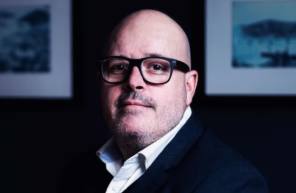
'I was really surprised at how emotional clients can get'

Joanna Little became a fellow of the Personal Finance Society at the tender age of 27, but when it came to dealing with the emotional demands of advice, she faced a steep learning curve.
Little, an industrial economics graduate, became chief executive of advice firm Emery Little, a third generation family business, in 2019, taking over from her father Andy Little, who retired but still serves as chairman of the business.
Her ascent into financial planning was quick, she always excelled at the technical and academic side of things, but it was not until later in her career that she found her confidence to deal with the people side of financial planning and the emotional demands that came with them.
"It was really challenging. I mean, it still is to be honest, you know, just making sure that you're able to genuinely show empathy, be comfortable in those really long awkward silences," she says.
"[But] the big thing that I've learned is just because I might not have gone through the exact same life events as a client, doesn't mean that I can't show empathy for what they're feeling because if someone's feeling sad about a divorce, just because I haven't gone through a divorce doesn't mean that I don't know what it's like to be sad.
"You can connect with people. So I think listening and genuine empathy, you can't really go too wrong with those things."
Little's journey to financial advice started young. She was stamping investment literature in her dad's makeshift home office from the age of 8 and progressed to helping out with admin tasks in the office by age 14. From then on she would regularly help out in the school holidays and during university breaks.
But it was not until graduating in 2010, on the back of the financial crisis, that she toyed with the idea of joining the family business in earnest.
"I had a conversation with my dad because obviously the labour market was quite difficult at that time, particularly for finance, and he said, 'oh, well, you know, if you get a 2:1 at least, would you consider joining Emery Little?'.
"He was like, 'that has to be a minimum requirement'," she jokes.
Little started as a junior paraplanner and enrolled with the Chartered Insurance Institute for her exams. She was drawn to the technical side of things and the exams came naturally to her, having just come out of uni.
Her career progressed quickly, partly aided by "healthy competition" from her colleague Alfie Mullan, now director of financial planning at Emery Little, and so her dad, his own retirement at the back of his mind, suggested she went on to become a fully qualified adviser at the firm – at Emery Little this meant to become chartered at the least.
"I went along with it particularly because Alfie was doing the same and he is just a much more competent person than me, and because we have been pushing each other this whole time it felt like a natural next step, that I didn't want to be left behind," she says.
By the age of 27 Little was a chartered financial planner and fellow of the PFS. But she soon discovered that there is more to financial planning than you can learn at school.
"I kind of assumed [financial planning] was like accountancy. It's like all spreadsheets and numbers and it's not personalised, and I was really surprised at how much it was about relationships and people."

She adds: "I think we forget money is actually a really emotional subject. It's tied to so much, it's tied to what [clients] can and can't do in life, what their dreams are, what some of their regrets might be.
"And when you see clients every year, for essentially like decades, you do just get to know them and their family and things happen that are important to them. So yeah, I was really surprised at how emotional clients can get."
She says she was battling with nerves when it came to client meetings but found some comfort in her chartered designation.
"You just get the sweats and nervousness before meeting a client when you're not as experienced. And so I definitely relied more on my technical ability and like being chartered because I just didn't have the confidence and I didn't think anyone would take me seriously being a young financial planner without being chartered.
"And I don't know that that's necessarily true on reflection, but it was really important for my confidence."
The turnaround came when she absolved a registered life planner course with the Kinder Institute, which, she says, opened her eyes to the impact life planning can have as part of the financial planning process.
"You have to go through it yourself because I think the best way to really buy into it is to feel the impact. And after that, I was like, oh, actually, it's the personal emotional bit that is really rewarding, both for clients and for us."
Her dad had done the course first and after that "it was kind of like a prerequisite for anyone else at Emery Little who wanted to be a financial planner", she says.
Drawn out succession process
Little took over Emery Little from her father in 2019 after a drawn out succession process, which eventually saw him exit in a buyout.
Her father had approached her in 2014 about whether she could see herself take over the business. His plan had always been to sell it on but if she wished to step into his shoes he would start to prepare the business for that.
"I don't think either of us had quite grasped how difficult it would be, one for him to start genuinely handing control over, and also for me to be able to step in that role," she says.
"So I think both of us had a lot of growing to do and working out how things how things could look like."
But as the process went on, she says there seemed to be a mismatch between the intellectual idea of handing over the business and the reality of stepping down, and there came a point when she felt the process had stalled. So she set up her own firm, as an appointed representative of Emery Little.

"I found myself not really being able to make some of the changes and do some of the things that I really want to do. And so myself and my colleague Alfie started kind of a separate company, still an appointed representative of Emery Little, called Eelah.
"We wanted to test out a different kind of service, with different types of clients, use different technologies and have the freedom to do that."
It was only then that her father put things in motion to hand over the reins of the business, she says.
"It was a bit of a tricky time because this was really exciting and [we thought] we'll kind of go down this road, and then my dad's like 'oh actually, I'm ready now, would you come back to Emery Little... and run Emery Little, like actually run it.
"And I was like, it's difficult because it's what I'd wanted all along, and he wasn't ready for it."
But she did agree and as the takeover progressed she asked Mullan to return and join her full time as well as transfer Eelah's clients.
Now Little says a lot could have gone better during that process. "I'm not sure that there is enough information, resource, support, or examples of people sharing their experience" about succession planning, she says.
She says people assume you can plan a succession in two years, whereas they should think "at least five years in advance".
"There is so much mentoring that needs to be done... and the incumbent owner needs loads of support, primarily emotional really because time flies and the retirement can be super scary.
"It's not really a financial transaction and when you come to the table and talk about finances, if you don't have support in all of those other areas, it makes that really difficult and long and drawn out."
She explains the firm was also approached by consolidators, and still is.
"When you have larger firms, like consolidator firms who are waving much bigger sums of money than I could ever afford, that does make it really difficult and if you're unable to articulate or really understand what the value for the person selling is, that's more than monetary, that's a really difficult conversation to have."
New beginnings
Her father's exit heralded change at the firm, including a reassessment of the firm's core values and definition of what excellence looks like, says Little.
"So much of the value that we add is intangible," she notes. "If the team are performing, they are fulfilled, they are challenged in a healthy way and therefore happy, that's the thing that's going to mean clients feel and get a great experience from the service. This culturally for us has definitely been a switch in mindset."
Emery Little has six financial planners looking after about 400 families between them, some across multiple generations. Of these advisers Little and Mullan are the oldest ones, at age 34.
For new clients the team follows the 'Evoke' process of life planning, which is a method to determine clients' life goals and make financial plans that allow them to fulfil these.
Little is also eyeing a change to the firm's charging structure, partly to allow her to do more to help younger generations.
"One of the things that I would love to be able to do, and I'm not sure anyone's got this quite right yet, is to be able to deliver a service that is of real value-add for younger accumulators, and like come up with a pricing strategy that works for them," she says.
Emery Little currently charges an initial fixed fee of up to £5,000 depending on the complexity of the case plus a 1 per cent ongoing charge, but Little says she would like to change the latter to either a completely fixed fee or a hybrid, whereby the percentage element is "much smaller", making it more enticing for clients to bring all their assets together in a way that is not solely motivated by money.
They also moved their clients' investment portfolios from active in-house managed ones to an evidence-based passively managed style.
That was quite a big project, she says, because it needed education, managing expectations, and explaining to clients why the firm's views had changed on active investing.
The majority of clients trusted the firm, she says, and the handful that insisted on active investing ended up switching firms.
"That's another big difference for us," she says. "We just have much more conviction in what we think is best for clients and do our most to try and get them comfortable with that, and if they really want to go against our advice then that's a bit of a red flag for the relationship more generally."
carmen.reichman@ft.com



